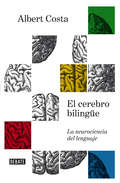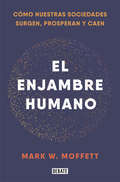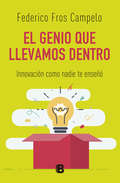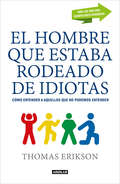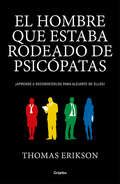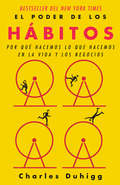- Table View
- List View
El azaroso arte del engaño: Historias del mundo de la casualidad y la estadística
by Gerardo Herrera CorralEl azar, el error y el engaño están presentes en todos los ámbitos de nuestras vidas: el trabajo, las relaciones personales, la política, la economía. /strong> El error, incluso, es parte esencial del material biológico que nos forma. Los seres vivos llegamos a ser lo que somos por el cambio continuo de la estructura genómica: el código grabado en nuestros genes se equivocó una y otra vez para que, alfin, una de las múltiples configuraciones acabara prevaleciendo. En otras palabras, los seres humanos somos producto del azar y el error. ¿Pero dónde está la frontera entre azar y error? Y más aún: ¿cuál es la diferencia entre error y engaño? Los errores pueden ser una fuente inmejorable de aprendizaje , si sabemos detectarlos. Por otro lado, se puede engañar sin mentir abiertamente, es decir, sin dar información falsa. Esto ocurre con frecuencia, por ejemplo, en la estadística, cuando se oculta información, se dan datos parciales o se ofrecen interpretaciones sesgadas. Por ello, nos dice Gerardo Herrera Corral, el conocimiento estadístico debería formar parte de la educación básica de toda persona. Sí, la estadística puede utilizarse para analizar la realidad, para explicar y comunicar mejor datos complejos, pero también puede emplearse para deformar los hechos, manipular y engañar al público. Este libro reúne historias en las que la estadística es la clave: ¿Es real el cambio climático? ¿Viven más tiempo los fumadores? ¿Hay vida en otros planetas? ¿Se acerca el fin de la cultura del automóvil? Al analizar estos casos, el autor nos ayudará a definir conmayor claridad las barreras entre verdad y mentira, azar y error.
El cerebro bilingüe: La neurociencia del lenguaje
by Albert CostaUna fascinante aproximación al funcionamiento del bilingüismo en el cerebro humano y cómo este adquiere y procesa el lenguaje. Todos estamos interesados en el lenguaje y nos hemos preguntado alguna vez cómo el cerebro humano lo adquiere y procesa. Pero, ¿cómo conviven dos lenguas en un mismo cerebro y qué implicaciones tiene esa convivencia? Para entender el funcionamiento del lenguaje el bilingüismo es fundamental. ¿Cómo consiguen los bebés expuestos a dos lenguas diferenciarlas? ¿Son las trayectorias de aprendizaje diferentes entre bebés bilingües y monolingües? ¿Cómo se deterioran las dos lenguas tras un daño cerebral? En este fascinante libro, Albert Costa busca arrojar luz sobre estas y muchas otras cuestiones a la vez que fomenta la curiosidad del lector acerca de uno de los aspectos más fascinantes de la ciencia cognitiva: el lenguaje.
El complejo de Cenicienta
by Colette DowlingUna obra incisiva, e indudablemente polémica, que ofrece a las mujeres las herramientas necesarias para que tomen en sus manos el camino de la verdadera independencia. Hace algunos años, Colette Dowling, escritora norteamericana de éxito y madre de tres adolescentes, descubrió algo que hizo tambalear el concepto que tenía de sí misma: quería simplemente que alguien cuidara de ella, la mimara y la hiciera sentirse segura. Luego descubrió con sorpresa que ese mismo deseo lo compartían miles y miles de mujeres, incluso aquellas que parecían haberse liberado tras superar muchos tabúes. Es este complejo de inferioridad el que la autora denomina «complejo de Cenicienta»: la creencia de muchas mujeres de que el «Príncipe azul» existe realmente, de que siempre habrá alguien más fuerte para apoyarlas, protegerlas, y tomar por ellas las decisiones más importantes.
El día que el mundo deje de comprar: Cómo el fin del consumo salvaría el medioambiente y a la humanidad
by J.B. MacKinnon¿Lo quieres o lo necesitas? Una gran crónica sobre lo que significaría dejar de comprar. Jamás los bienes materiales habían sido tan importantes para nuestra vida y nuestra identidad. Agotamos los recursos del planeta dos veces más rápido de lo que pueden regenerarse. Compramos el doble de prendas de ropa que hace veinte años y las conservamos durante la mitad de tiempo. Vivimos inmersos en la cultura del consumo compulsivo, conocemos las consecuencias y, sin embargo, no podemos parar. Pero ¿cómo sería nuestro mundo si dejásemos de hacerlo? ¿Se colapsaría la civilización? ¿Asistiríamos al renacimiento de la ecología del planeta? ¿Qué ocurriría con nuestra manera de pensar, crear productos, invertir el tiempo, expresar nuestra individualidad? J. B. MacKinnon entrevista a productores artesanales y sociedades de consumo cero, visita lugares donde las economías han experimentado cierres temporales y reúne una gran cantidad de opiniones de expertos. El resultado es una crónica profundamente perspicaz y actual, una exploración esencial de quiénes somos y qué consumimos, y una visión de un futuro, quizá, más sostenible. Sabemos que con nuestras propias decisiones hemos puesto al mundo en peligro; ahora debemos preguntarnos si seremos capaces de cambiar de paradigma. La crítica ha dicho: «Un análisis bien documentado y provocador que ofrece esperanza y optimismo para nuestro futuro».Kirkus «Ingenioso y erudito. Muestra con maestría la compleja relación entre la cultura del consumo y la naturaleza. Un agudo relato que ofrece un punto de partida para el cambio (y para el optimismo)».Library Journal «Una delicia. MacKinnon explora a fondo un enigma central en nuestros días: en qué medida somos lo que compramos y cómo comprar menos podría hacernos mucho mejores».Andrew Blum «Con ingenio, precisión y reflexiones sorprendentes, MacKinnon analiza en profundidad lo que hemos hecho y lo que podríamos hacer mucho mejor. Es uno de los libros más importantes y mejor escritos que he leído».Ronald Wright «Lleno de esperanza y de profundas reflexiones, sin pretensiones ni sermones, es una lectura emocionante y verdaderamente inspiradora. No pude parar de leerlo».Joel Bakan «Bien investigado y estimulante. Los lectores se animarán a realizar cambios en sus propios hábitos de compra».Publishers Weekly «En medio de una gran cantidad de manuales a menudo simplistas para una vida sencilla, este libro se destaca por su curiosidad, humanidad y apreciación genuinamente global de por qué consumimos demasiado y qué hacer al respecto».Frank Trentmann, autor de Empire of Things
El enjambre humano: Cómo nuestras sociedades surgen, prosperan y caen
by Mark W. MoffettUn libro lleno de sorpresas que fascinará a los lectores de Harari y Diamond. Uno de los rasgos que distinguen a una comunidad de chimpancés de una comunidad humana es que, mientras que un neoyorquino puede volar hasta Borneo sin temer por su vida, un chimpancé que se aventure en territorio ajeno corre un peligro mortal. Los psicólogos no han ayudado mucho a explicar esta diferencia fundamental: durante décadas han defendido que el límite de un grupo social está en los ciento cincuenta miembros. Sin embargo, en la sociedad humana conviven muchísimos más individuos. ¿Cómo es posible esta convivencia? Mark W. Moffett rompe nuestros esquemas mentales a partir de hallazgos en los campos de la psicología, la sociología y la antropología y nos ofrece una brillante explicación de las adaptaciones sociales que unen las comunidades modernas. En la línea de grandes fenómenos editoriales como Sapiens y Armas, gérmenes y acero, El enjambre humano es una reveladora investigación sobre cómo el ser humano ha llegado a desarrollar complejísimas civilizaciones. La crítica ha dicho...«Moffett lleva a cabo una intrigante presentación de nuestra sociedad en el contexto del reino animal. Es una obra genial que debería despertar el interés de cualquier lector que sienta la más mínima curiosidad por las sociedades humanas, lo cual nos implica (o debería implicarnos) prácticamente a todos.»Publishers Weekly «Este libro, de agradable lectura, es ambicioso en su amplitud interdisciplinaria, riguroso en su ciencia y profundamente estimulante en sus implicaciones.»Robert Sapolsky, autor de Compórtate «Moffett tiene el alma de un explorador del siglo XIX, un naturalista errante en la estela de Darwin y Wallace.»Edward O. Wilson, premio Pulitzer «Un relato bien documentado y detallado sobre por qué las sociedades han sido parte fundamental de la experiencia humana desde nuestros más antiguos antepasados. Muy recomendable para los fans de Colapso, de Jared Diamond, y los de Sapiens, de Yuval Noah Harari.»Library Journal, crítica destacada «Un tour-de-force.»Donald Johanson, paleontólogo, descubridor de Lucy y fundador del Instituto de los Orígenes Humanos «Un fascinante recorrido por las estructuras de las sociedades y sus patrones de comportamiento.»Nature «Maravilloso.»The Financial Times «Asombroso... una serie de lecciones sobre los humanos y nuestras sociedades deliciosamente accesibles e ingeniosas.»Kirkus Reviews, crítica destacada
El espejismo humanitario
by Jordi Raich¿Salvar a los demás para salvarse a uno mismo? Apodado el Pasafronteras a raíz de su entrada ilegal en Zaire, Jordi Raich pasó tres semanas encarcelado en Uganda acusado de espiar para la CIA, estuvo perdido en el desierto somalí con el ejército italiano a la espera de un general que nunca llegó, fue atacado por los heridos que salvó del bombardeado hospital de Vukovar, repartió comida bajo el fuego de morteros rebeldes durante el asedio a Monrovia e hizo jogging con los guardias de la prisión de Guantánamo.Tras veinte años de trabajo con distintas organizaciones humanitarias en docenas de conflictos armados y catástrofes, el autor cuestiona, a la luz de sus vivencias, el mundo de la ayuda humanitaria. Anécdota, pasión, tristeza y humor sirven para explorar los dilemas políticos y éticos de la solidaridad y las relaciones del humanitario -un misionero del tercer milenio- con otros actores del teatro filantrópico: víctimas egoístas, políticos sin escrúpulos, periodistas susceptibles, militares fanáticos y cooperantes aprovechados. Con un estilo ameno y provocador, Raich analiza el comportamiento de la industria "sin ánimo de lucro" que asegura sanar al enfermo, alimentar al hambriento, cobijar al desamparado, proteger al desvalido. Sin embargo, pese a las apariencias, la ayuda humanitaria también mata, es corrupta, competitiva y mezquina, financia guerras, empeora la situación de las víctimas a las que socorre y culpa a los demás de sus propios defectos. El espejismo humanitario combina testimonio y reflexión para despojar a la acción humanitaria de su inmerecido y perjudicial manto de inocencia y hacerla más cercana, con el fin de que el lector conozca las grandezas y las miserias cotidianas de la solidaridad.
El espejismo humanitario
by Jordi Raich¿Salvar a los demás para salvarse a uno mismo? Apodado el Pasafronteras a raíz de su entrada ilegal en Zaire, Jordi Raich pasó tres semanas encarcelado en Uganda acusado de espiar para la CIA, estuvo perdido en el desierto somalí con el ejército italiano a la espera de un general que nunca llegó, fue atacado por los heridos que salvó del bombardeado hospital de Vukovar, repartió comida bajo el fuego de morteros rebeldes durante el asedio a Monrovia e hizo jogging con los guardias de la prisión de Guantánamo.Tras veinte años de trabajo con distintas organizaciones humanitarias en docenas de conflictos armados y catástrofes, el autor cuestiona, a la luz de sus vivencias, el mundo de la ayuda humanitaria. Anécdota, pasión, tristeza y humor sirven para explorar los dilemas políticos y éticos de la solidaridad y las relaciones del humanitario -un misionero del tercer milenio- con otros actores del teatro filantrópico: víctimas egoístas, políticos sin escrúpulos, periodistas susceptibles, militares fanáticos y cooperantes aprovechados. Con un estilo ameno y provocador, Raich analiza el comportamiento de la industria "sin ánimo de lucro" que asegura sanar al enfermo, alimentar al hambriento, cobijar al desamparado, proteger al desvalido. Sin embargo, pese a las apariencias, la ayuda humanitaria también mata, es corrupta, competitiva y mezquina, financia guerras, empeora la situación de las víctimas a las que socorre y culpa a los demás de sus propios defectos. El espejismo humanitario combina testimonio y reflexión para despojar a la acción humanitaria de su inmerecido y perjudicial manto de inocencia y hacerla más cercana, con el fin de que el lector conozca las grandezas y las miserias cotidianas de la solidaridad.
El futur del català depèn de tu
by Carme Junyent Bel ZaballaUna proposta per evitar que la llengua catalana desaparegui. El següent diàleg segurament us és familiar: -Què et costa parlar en castellà? -Ben mirat, no em costa gens. Tinc la sort de saber-ne; per tant, no compliquem les coses. Carme Junyent és especialista en l'estudi de llengües amenaçades arreu del món. Coneix profundament els tics, les autotrampes i, en definitiva, els símptomes d'un camí sense retorn. Per això ens alerta i ens explica de manera clara i diàfana el com i el per què el català està malalt. Sí, el català corre perill. Però encara no és massa tard! Per salvar la llengua TOTS hem de canviar urgentment el nostre comportament lingüístic. Els que la tenim com a primera llengua. I els que no, però que la volem continuar sentint, o també parlant. -Què em costa parlar en castellà? -Em costa que cada vegada que NO parlo en català, porto la llengua cap a un camí de no-retorn. I per això necessito aprendre a no cedir sempre. I també per això cal que tu et posis en el meu lloc, perquè tots plegats entenguem què hi ha en joc. Sense tu i sense mi no ens en sortirem pas. Perquè el català té un avantatge únic: hi ha moltíssima gent que no el parla però l'entén. I fins i tot molts l'estimen. Aprofitem-ho!
El futuro del trabajo ya no es lo que era
by Albert CañigueralUn lúcido análisis de las perspectivas del trabajo en el futuro y de las consecuencias del COVID-19 en nuestra sociedad. Fenómenos como el teletrabajo o las plataformas digitales nos obligan a preguntarnos por lo que nos espera en el futuro. ¿Seguiremos teniendo un único trabajo? ¿Tendrá sentido hacer el mismo horario cada día? ¿Cómo serán los empleos después del COVID-19? A través de este ensayo, Albert Cañigueral (El trabajo ya no es lo que era, Conecta, 2020) responde a estas preguntas, demostrando que es necesario buscar nuevas definiciones para el empleo. Además, propone siete utopías del trabajo para que, entre todos, podamos diseñar un futuro mejor. «Seamos valientes. Diseñemos futuros de trabajo deseables»
El futuro es ahora: Un viaje a través de la realidad virtual
by Jaron LanierEl padre de la realidad virtual nos explica sus infinitas posibilidades a través de su experiencia con la tecnología. A través del fascinante recorrido de una vida dedicada a la tecnología, Jaron Lanier expone la capacidad de la realidad virtual para iluminar y amplificar la comprensión que tenemos de nuestra especie y ofrece a los lectores una nueva perspectiva sobre cómo el cerebro y el cuerpo humano se conectan al mundo. Al entender la realidad virtual como una aventura tanto científica como cultural, Lanier demuestra el componente humanístico que esta aporta a la tecnología. Si bien sus libros anteriores ofrecían una visión más crítica de las redes sociales y de otras manifestaciones de la tecnología, en El futuro es ahora el autor argumenta que la realidad virtual puede hacer que nuestra vida sea más rica y más completa. Una obra que no solo nos muestra qué significa ser humano en esta era de posibilidades tecnológicas sin precedentes, sino que también une la dimensión tecnológica con nuestra experiencia corporal. Reseñas:«Una historia maravillosa, profundamente humana y sumamente personal.»Dave Eggers «Es el padre de la realidad virtual y un genio de la tecnología punta.»Sunday Times «Una mente tan ilimitada como internet.»Evening Standard «Íntimo e idiosincrásico [...] peculiar y fascinante [...] La vívida imaginación de Lanier se convierte en un personaje más. Su visión es humanista e insiste en que el objetivo más importante del desarrollo de la realidad virtual debe ser la conexión humana.»The New York Times Book Review «Una lectura esencial, no solo para los conocedores de la realidad virtual, sino para cualquiera interesado en comprender cómo la sociedad ha llegado a convertirse en lo que es hoy en día y en qué podría convertirse en un futuro no tan lejano.»The Economist «Brillante e inspirador.»Publishers Weekly
El genio que llevamos dentro: Innovación como nadie te enseñó
by Federico Fros Campelo¿Qué es innovar? ¿Hace falta creatividad, ambición, conocimientos, improvisación? ¿Cuánto de la circuitería cerebral se pone en marcha en la innovación? ¿Es crear algo que no existe o mejorar lo que ya está? ¿Cómo juegan las necesidades de los clientes en la innovación? En este libro, el autor explora el concepto desde perspectivas distintas. La velocidad a la que están sucediendo los cambios en el mundo es de vértigo. Entonces, ¿cómo ingeniártelas para que tu proyecto funcione? ¿Cómo lograr que se te ocurran ideas que sirvan en serio? La innovación se está difundiendo por todos lados. Ves un video en YouTube y te habla del asunto, vas a un evento y aparecen charlas sobre el tema. Buenísimo para entretenerte, pero... ¿cómo innovás en lo tuyo? Por más nube de hashtags disruptivos que te tiren encima, nadie nunca te enseñó realmente a innovar. Hasta ahora. Más irreverente y frontal que antes, Federico Fros Campelo llega con su sexto libro. Acá no vas a encontrar cantinelas descriptivas ni tsunamis de teoría. En este libro te cuenta de manera práctica cómo se puede innovar de verdad. Al combinar el funcionamiento de tu cabeza con los de las organizaciones y el mercado, su método de Innovación Cognitiva © te ofrece cinco pasos que van a cambiar radicalmente tu manera de pensar y de ver el mundo. Cinco pasos que te llevarán a producir ideas imprescindibles para los que compren tu trabajo, consuman tus servicios y productos. O te reinventás o te comen los leones. Aquí, tu guía de supervivencia.
El hombre que estaba rodeado de idiotas: Cómo entender a aquellos que no podemos entender
by Thomas EriksonEste libro describe de forma concreta y amena uno de los métodos más extendidos de clasificación de las diferencias en la comunicación humana. Con trasfondo científico, y partiendo de situaciones cotidianas, proporciona una herramienta útil para entender las diferencias más significativas entre estilos de comunicación y responde a la pregunta que todos nos hacemos: «¿Qué puedo hacer yo al respecto?». ¿Alguna vez has intentado razonar con tu pareja y el resultado ha sido nefasto? ¿O has salido confuso de una reunión, con la sensación de no haber entendido nada de lo que se estaba hablando? O, lo que es peor, a veces parece que la gente no entiende lo que les dices, por más claramente que lo expliques. Todo un misterio... Aquí encontrarás la solución. Bienvenido a un revelador libro repleto de situaciones con las que seguro que te sentirás identificado, tanto para bien como para mal, y que, con un poco de suerte, te confirmarán que el idiota no eres tú. Thomas Erikson te garantiza que, después de leer este libro, el número de idiotas que te rodea se reducirá drásticamente, y entenderás lo que tu entorno intenta decirte. Después de leer este libro, ya no verás nada como antes.
El hombre que estaba rodeado de idiotas: Cómo entender a aquellos que no podemos entender
by Thomas EriksonEste libro describe de forma concreta y amena uno de los métodos más extendidos de clasificación de las diferencias en la comunicación humana. Con trasfondo científico, y partiendo de situaciones cotidianas, proporciona una herramienta útil para entender las diferencias más significativas entre estilos de comunicación y responde a la pregunta que todos nos hacemos: «¿Qué puedo hacer yo al respecto?». ¿Alguna vez has intentado razonar con tu pareja y el resultado ha sido nefasto? ¿O has salido confuso de una reunión, con la sensación de no haber entendido nada de lo que se estaba hablando? O, lo que es peor, a veces parece que la gente no entiende lo que les dices, por más claramente que lo expliques. Todo un misterio... Aquí encontrarás la solución. Bienvenido a un revelador libro repleto de situaciones con las que seguro que te sentirás identificado, tanto para bien como para mal, y que, con un poco de suerte, te confirmarán que el idiota no eres tú. Thomas Erikson te garantiza que, después de leer este libro, el número de idiotas que te rodea se reducirá drásticamente, y entenderás lo que tu entorno intenta decirte. Después de leer este libro, ya no verás nada como antes.
El hombre que estaba rodeado de psicópatas
by Thomas Erikson¡Evita a los depredadores bajo apariencia humana que solo quieren aprovecharse de ti! Después de El hombre que estaba rodeado de idiotas, Thomas Erikson nos trae un nuevo libro para aprender a identificar y evitar los comportamientos abusivos de las personas que nos rodean. Cuidado con los psicópatas porque están donde menos te lo esperas. Suelen ser personas carismáticas, agradables, encantadoras y atentas. ¿Fantástico, verdad? Pero, abrid bien los ojos, detrás de tanta educación es donde mejor se esconden. El hombre que estaba rodeado de psicópatas nos acerca a una realidad que muchas veces queda camuflada, pero que nos afecta a diario en nuestras vidas. Identificar el carácter abusivo de algunas personas y aprender cómo manejarlas determinará el éxito en nuestras relaciones tanto personales como profesionales. Después de leer este libro, sabrás exactamente qué hacer con laamabilidad encubierta de los psicópatas que te rodean. Thomas Erikson ha trabajado durante años con las herramientas descritas en este libro y sabe bien cómo usarlas. Tiene una amplia experiencia como coach, formador de líderes, profesor universitario, empresario y especialista en comportamiento..
El libro de los negocios (DK Big Ideas)
by DKGrandes ideas, explicaciones sencillasCon un lenguaje claro, El libro de los negocios presenta concisas explicaciones que desbrozan la jerga académica, esquemas que simplifican las teorías más complejas, e ingeniosas ilustraciones que juegan con nuestras ideas sobre el mercado global.Un gran líder empresarial ¿nace o se hace? ¿Cómo se crea una marca exitosa? ¿Por qué algunas empresas fracasan y otras prosperan? A lo largo de la historia, los gurús de los negocios han ofrecido ideas que han configurado y mejorado el mundo empresarial.¡El mundo de los negocios explicado de forma sencilla!Desde que las civilizaciones primitivas empezaron a comerciar con bienes y servicios, la humanidad ha pensado en los negocios. La aparición de productos especializados y el uso del dinero como medio de intercambio permitieron a sociedades e individuos adquirir un «perfil de negocios», para emplear una expresión moderna.Una enriquecedora lectura que nos cuenta sobre cómo los antiguos egipcios, mayas, griegos y romanos supieron que la generación de riqueza mediante el mecanismo del comercio era esencial para adquirir poder y así sentaron las bases sobre las que prosperó la civilización.Tanto el emprendedor que pone en marcha un negocio global o local, o bien el director ejecutivo con su visión más amplia, como el consumidor curioso hallarán en este libro de negocios en español muchas ideas inspiradoras, desde cómo crear el plan de negocio hasta cómo gestionar la publicidad de un negocio a través de los siguientes capítulos: • Empieza con poco, piensa a lo grande. Emprender el negocio del siglo y expandirlo. • Encender el fuego. Liderazgo y recursos humanos. • Hacer que el dinero rinda. Gestionar las finanzas. • Trabajar con una visión. Estrategia, operaciones, modelos de negocios. • Éxito en ventas. La gestión del marketing. • Distribución y productos. Producción y posproducción. El libro de los negocios, pertenece a la galardonada serie Grandes Ideas explica temas complejos de un modo fácil de entender mediante explicaciones claras y alejándose del academicismo tradicional. Su creativo diseño y los gráficos innovadores que acompañan al texto hacen de esta serie una introducción perfecta a una gran diversidad de materias para toda la familia.
El libro del hombre
by Osho OshoEste libro contiene una selección de respuestas a preguntas que se formulan habitualmente hombres de las más diversas edades y procedencias. Osho define al hombre a través de diferentes estereotipos: desde el Adán, el esclavo, el hijo, el homosexual, el marido, el político, el sacerdote, etcétera, a través de veintinueve capítulos, aportando nuevas ideas para convertir toda la carga negativa que normalmente ha conllevado el ser hombre en aspectos positivos. Toda la sabiduría de Osho, además de sus anécdotas, chistes y técnicas de meditación, sirven en este libro para que los hombres se descubran a sí mismos y también para que las mujeres entiendan las cualidades positivas que puede contener la masculinidad. Un libro que, junto a El libro de la mujer y El libro del niño, supone una aportación imprescindible para el conocimiento del ser humano a las puertas de un nuevo milenio.
El loro en el limonero
by Chris StewartSegunda parte de la trilogía sobre el encanto de la vida alternativa que vive Chris Stewart en la Alpujarra granadina. Con el formidable éxito de ventas de Entre limones -el divertidísimo relato autobiográfico de un joven inglés que, con tal de no vestir traje y acudir a una oficina, se gasta todos sus ahorros en la compra de un ruinoso cortijo en la Alpujarra granadina- Chris Stewart dio comienzo a su célebre trilogía sobre el irresistible encanto de la vida alternativa, en la que los pequeños sucesos cotidianos y la tranquila observación del espectáculo que supone la actitud del hombre ante sus semejantes y ante la naturaleza compensan con creces los placeres materiales de una vida normal. Acompañado por su mujer Ana, la pequeña Chloé y un loro algo misántropo que forma parte del núcleo familiar, Chris relata con su inimitable estilo las nuevas experiencias que le depara su retiro voluntario del mundanal ruido. Su relación con los vecinos, los entresijos de la escolarización en España, el descubrimiento de un plan para construir una presa que dejaría buena parte del valle sepultada bajo el agua, todo es motivo de asombro. Y por añadidura, el éxito de su primer libro atrae a un hatajo de periodistas ingleses interesados en su vida anterior a su llegada a las Alpujarras: las temporadas pasadas en Suecia esquilando ovejas en mitad del invierno, su primer contacto con España para aprender a tocar la guitarra flamenca, su trabajo en un circo y su breve carrera musical como batería del grupo de rock de su colegio: Genesis. La crítica ha dicho...«Stewart tiene un talento especial para captar los diálogos, una curiosidad insaciable, un optimismo contagioso y un plácido sentido del humor a prueba de conspiraciones xenófobas: Beatus ille.»Babelia «Cuando un autor es tan divertido y modesto como Stewart, uno no se cansa de leer su historia.»The Times «Stewart nunca es condescendiente, se limita a observar [...] divertido, generoso y amable.»The Guardian «Stewart nunca pierde el olfato para detectar las buenas anécdotas.»The Telegraph
El machismo invisible regresa
by Marina CastañedaNo es necesario ser mujer para ser víctima del machismo, ni hombre para ser machista. El machismo sigue vivo y se ha vuelto aún más urgente desenmascararlo, comprenderlo y combatirlo bajo todas sus formas, debido a sus enormes costos psicológicos, sociales y económicos en las sociedades modernas. Si bien la violencia contra las mujeres es su manifestación más extrema, existen mecanismos más sutiles que se expresan en la comunicación, el trabajo, la salud y la sexualidad mediante roles de género sumamente rígidos, limitantes e ineficientes. Que las mujeres tengan menos acceso a la educación y al trabajo bien remunerado equivale a desperdiciar un inmenso capital humano; que tengan menor poder de compra priva a las empresas de un nicho de mercado importante; que los varones sólo sepan "cosas de hombres" y las mujeres "cosas de mujeres" crea personas con sólo la mitad de las habilidades que requiere la vida moderna. En el campo laboral, el llamado techo de cristal sigue impidiendo que las mujeres lleguen a los puestos ejecutivos más altos; y, en la vida pública, la representación popular sigue siendo, muy mayoritariamente, un asunto de hombres. Para que esto cambie, no basta con mejorar la condición de las mujeres. Ya no se trata de "darle oportunidad a las mujeres", quienes ya han demostrado con creces su capacidad intelectual y laboral. Lo que se requiere ahora es cambiar las reglas del juego en todas las áreas de la vida; y, para ello, es indispensable la participación de los hombres. En esta nueva edición revisada y actualizada, Marina Castañeda incluye una sección sobre la misoginia, datos sobre la violencia contra las mujeres y dos amplios cuestionarios para que hombres y mujeres reflexionen acerca de los mecanismos invisibles del machismo en la vida diaria.
El negocio de la salud: Pacientes, médicos, sanatorios, obras sociales, prepagas y laboratorios. Cómo empoderarnos sin perder la vida en el intento
by Soledad FerrariEl sistema de salud argentino tiene inconvenientes estructurales y financieros, burocracia y corrupción. En el medio, los pacientes están sometidos a estrategias comerciales de laboratorios que mercantilizan enfermedades. Ante un contexto sombrío, se ofrece un panorama sobre medicina preventiva y otras alternativas. La salud es nuestro bien más preciado, y lo ponemos todos los días en manos de otros: médicos, sanatorios, obras sociales, prepagas, laboratorios y farmacéuticas. ¿Pero cómo sabemos que recibimos el diagnóstico correcto? ¿Qué formación tiene ese médico que nos atiende? ¿Por qué existe tanta burocracia en las obras sociales y en las empresas de medicina prepaga? ¿Qué hay detrás de los valores del colesterol, que cambian constantemente? ¿Cómo se ocupa el Estado de la salud de todos? Después de años de investigación, Soledad Ferrari cuenta -sin dejar afuera su propia experiencia- cómo funciona el sistema de salud argentino, cómo estamos expuestos a la sobredosis de medicina y cuál es el negocio que se esconde, por ejemplo, detrás de la leche de fórmula y de las campañas contra el cáncer. Además, presenta posibilidades alternativas de prevención y cuidado en el marco de la medicina tradicional.
El negocio de las Universidades en Chile
by Maria Olivia MonckebergEl negocio de las universidades en Chile es una provocativa invitación a observar el presente con otros ojos, a indagar detrás de los edificios que hoy se llaman "universidad" y de la abrumadora publicidad que, año a año, tienta con sus ofertas a los "alumnos clientes". Los grupos de poder político, económico y religioso que controlan gran parte de la vida de Chile del siglo XXI han estado en el eje de las investigaciones de la periodista María Olivia Mönckeberg, quien ha puesto el foco en las redes que se entralazan e influyen en los más diversos aspectos de la sociedad.Para la autora de El saqueo de los grupos económicos al Estado chileno y de El imperio del Opus Dei en Chile, la educación, además de ser clave en la formación de las nuevas generaciones, es un campo crucial donde se da la batalla por el poder. Dedicada hace cuatro años a investigar a fondo lo que ocurre en el "mercado" de las universidades, publicó en 2005 La privatización de las universidades. Una historia de dinero, poder e influencias. Si aquel libro constituye una mirada al pasado reciente, El negocio de las universidades en Chile es una provocativa invitación a observar el presente con otros ojos, a indagar detrás de los edificios que hoy se llaman "universidad" y de la abrumadora publicidad que, año a año, tienta con sus ofertas a los "alumnos clientes". Esta obra es una culminación de las investigaciones anteriores. En momentos en que la educación en el país está en el primer plano de las preocupaciones, María Olivia Mönckeberg aporta una ilustrativa mirada que permite identificar -con nombres y apellidos- quién es quién en este escenario, y conocer los entretelones y secretos de un gran negocio en doble dimensión: sus objetivos ideológicos y las operaciones lucrativas, que comprometen el futuro de los jóvenes y la consolidación de una plena democracia.
El nuevo lujo: Experiencias, arrogancia, autenticidad
by Yves Michaud<P>La nueva cara del lujo, un sector en auge incluso en plena crisis. Institutos de belleza, safaris, cruceros y paquetes turísticos excepcionales, alta gastronomía, viajes espaciales... <P>Incluso en tiempos de crisis, el mercado del lujo goza de una salud de hierro #un dato llamativo, incluso insolente#, pero ha adoptado, advierte el filósofo Yves Michaud, una nueva cara: no se trata ya tanto de un lujo basado en los objetos sino de un lujo de la experiencia. <P> A partir de sorprendentes datos y ejemplos, El nuevo lujo analiza este fenómeno planetario desde un punto de vista filosófico, psicológico y sociológico y con un enfoque tan inteligente como irónico. Yves Michaud da cuenta de las astutas estrategias de posicionamiento llevadas a cabo por las grandes firmas, que venden moda y glamour, y señala lo sintomático de ese frenesí contemporáneo del lujo, tras el cual hay un individuo que busca desesperadamente su identidad. <P>El lujo es, pues, mucho más que un sector de la economía: es un paradigma de nuestra sociedad. La crítica ha dicho...«Yves Michaud desvela los mecanismos de una industria en plena expansión. Análisis de alta gama.»Raphaëlle Elkrief, Grazia «El autor expone con brío los resortes de la ostentación en quienes aspiran a "ser alguien".»Nicolas Vulser, Le Monde des Livres
El oficio del analista
by Jorge BaficoUn libro de consulta imprescindible para estudiantes de psicología, pero que también será atractivo para cualquier lector interesado en la temática. ¿Qué se hace en ese lugar llamado análisis? ¿Cuáles son las diferencias entre el psicoanálisis, las psicoterapias o, incluso, en las conversaciones profundas e íntimas que pueden darse entre dos personas? En definitiva, ¿de qué se trata lo singular de un análisis? Este libro intenta desvelar estas y otras interrogantes que surgen del quehacer psicoanalítico. Sus contenidos tienen como punto de partida el seminario «El oficio del analista», que Jorge Bafico llevó adelante entre los años 2018 y 2021. Durante estos encuentros, el autor indaga en el misterio que muchas veces encierra un psicoanálisis, a partir de diferentes casos clínicos. Con su habitual estilo ameno y cómplice con el lector, Jorge Bafico dialoga en cada capítulo con textos teóricos y casos clínicos, para presentar con mayor claridad las diferentes modalidades en que el analista se pone en juego.
El origen de la monstruosidad
by Jorge BaficoJorge Bafico recorre las increíbles historias de psicóticos, asesinos seriales y monstruos morales. La monstruosidad está entre nosotros. Todos los días leemos o escuchamos historias de personas capaces de cometer las más grandes atrocidades sin sentir remordimientos. A menudo se trata de personas consideradas socialmente como “normales”, adaptadas, incluso anodinas. ¿Qué los impulsa en la búsqueda hacia el dolor? ¿Dónde está la línea que separa la cordura de la locura? ¿Todos somos potencialmente seres monstruosos? A través del vértigo de una lectura adictiva, este libro inquietante nos precipita por los oscuros pasadizos de la psique humana.
El país que nos habla
by Ivonne BordeloisUn lúcido y profundo trabajo de investigación sobre la manera de hablarde los argentinos. La autora, Ivonne Bordelois, describe con impecable rigor metodológico ycon admirable capacidad de observación social los avatares que ha idosufriendo, a través del tiempo, el lenguaje de los argentinos, sometidoa las influencias de los frecuentes cambios que sufrió la población delpaís como resultado de los grandes procesos inmigratorios, de lassucesivas transformaciones socioculturales y, más recientemente, de loshábitos incorporados por los avances de la informática.Acosados por una crisis política y social que nos ha despojado de casitodo, es importante que los argentinos nos preguntemos si lo hemosperdido todo o si hay algo que todavía nos queda. De eso trata,justamente, el ensayo de Ivonne Bordelois, de la naturaleza inalienabledel lenguaje, que es el gran recurso que nos ha dejado la historia.
El poder de los hábitos
by Charles DuhiggHay pocos libros que se convierten en manuales esenciales de vida. Este es uno de ellos. Financial Times En El poder de los hábitos, el premiado periodista Charles Duhigg nos lleva al límite de los descubrimientos científicos que explican por qué existen los hábitos, cómo nos condicionan y cómo cambiarlos. Duhigg ofrece una gran cantidad de información en una fascinante narrativa que nos lleva a las salas de reuniones de Procter & Gamble, a las gradas de la NFL, y hasta al movimiento por los derechos civiles, y presenta una manera completamente nueva de entender la naturaleza humana y su potencial. En esencia, El poder de los hábitos contiene un mensaje estimulante: la clave para hacer ejercicio con regularidad, perder peso, ser más productivo y conseguir el éxito consiste en entender el modo en que funcionan los hábitos. Como demuestra Duhigg, si somos capaces de sacar partido a este nuevo método, conseguiremos transformar nuestra vida laboral, social y personal.

